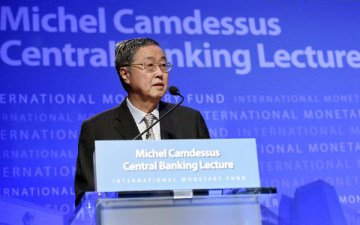Although the central parity rate of Chinese yuan has weakened against the U.S. dollar in the past days, the on-shore and off-shore market is calm. From last Friday to Tuesday, the yuan lost 870 basis points against the U.S. dollar, although it regained some territory Wednesday.
However, the on-shore and off-shore market was little changed: There was no panic selling. China's central bank reassured the market on Tuesday that although the yuan weakened against the U.S. dollar, it remained stable against a basket of currencies. This illustrates a shift from the past, when the currency's performance was not so transparent.
When China first moved to make the yuan's value more market-based by referencing it to a basket of currencies instead of the dollar alone, the market was spooked, setting off a downward adjustment of the yuan. Since then, the central bank has increased transparency of the new mechanism and enhanced communication with the market to reduce fears over depreciation.
Market analysts attributed the yuan's recent weakening against the U.S. dollar to the new mechanism. When the yuan strengthened against the U.S. dollar on Wednesday, it demonstrated that the mechanism did indeed work -- as the value of the basket of currencies moved, so did the yuan.
As communication between the central bank and the market becomes more effective, sentiment will stabilize. The Chinese authority has reaffirmed that the yuan's devaluation is not in its interests, as it could disrupt China's economic rebalancing efforts. China's economy is faced with mounting downward pressure. However, with structural reform well underway and rebalancing efforts working out, China's economic fundamentals remains sound. That rules out substantial depreciation of the yuan, thus, supports the long-term stability of the currency.























Latest comments